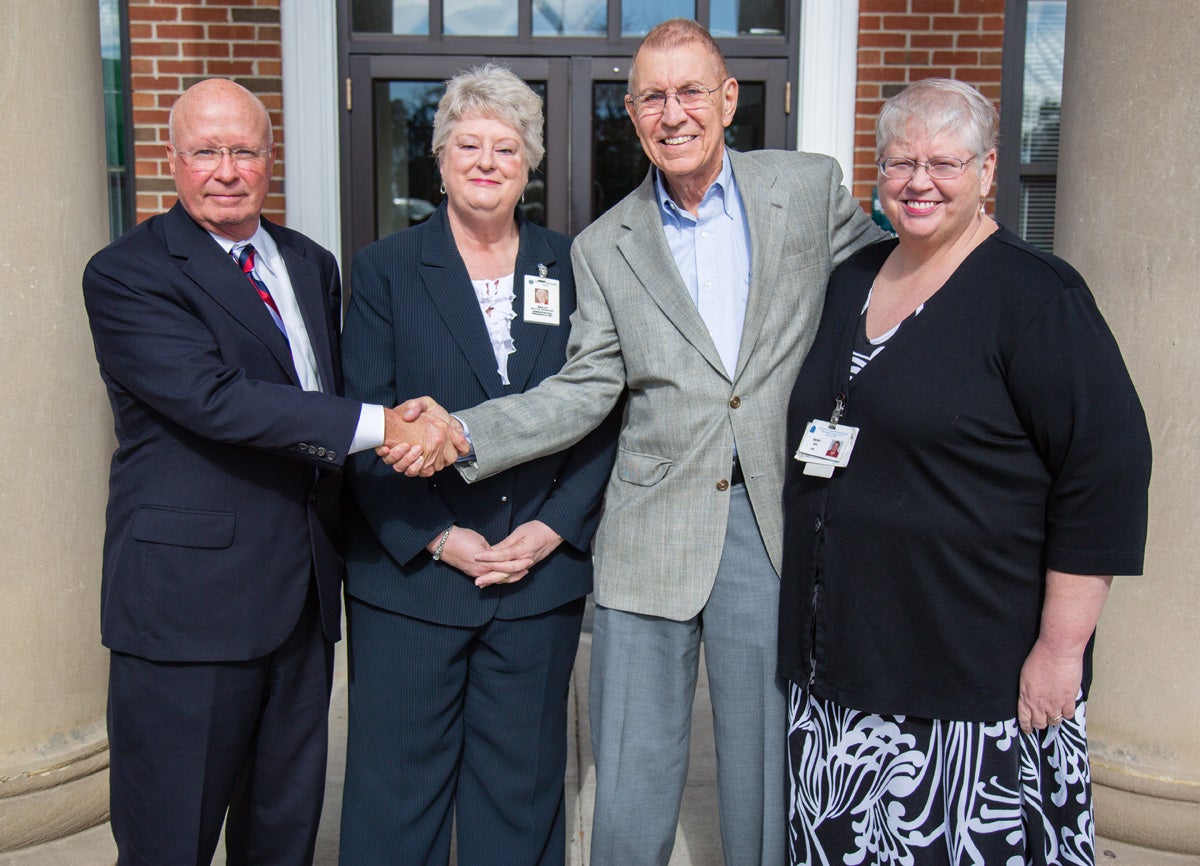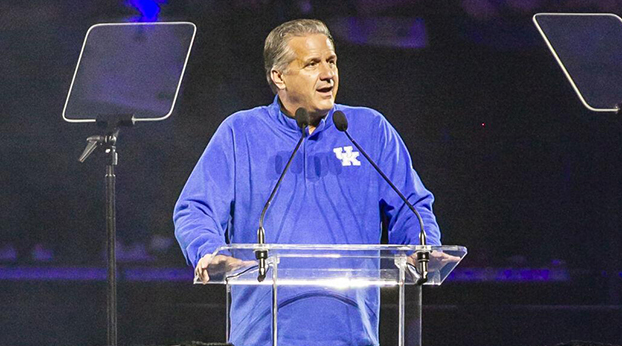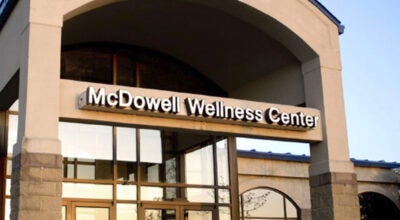Ephraim McDowell acquiring Haggin hospital
Published 8:22 am Wednesday, November 1, 2017

- Ben Kleppinger/ben.kleppinger@amnews.com From left, Ephraim McDowell Health board chair Alan White and CEO Sally Davenport; and Haggin hospital chair James Ingram and CEO Vicki Reed stand together in front of the James B. Haggin Memorial Hospital Monday.
HARRODSBURG — Ephraim McDowell Health will be absorbing James B. Haggin Memorial Hospital in Harrodsburg into its “family of health care services” on Dec. 1.
Rumors of Danville-based EMH buying the Mercer County hospital had been circulating for months, but nothing had been confirmed. The plan was made known to local newspapers this week, after executives for both companies told their employees.
The merger does not include plans to close the Haggin hospital, said Sally Davenport, CEO of EMH; it will become the third hospital in the EMH company, along with Fort Logan Hospital in Stanford and the flagship Ephraim McDowell Regional Medical Center in Danville.
“It’s a move … that will make us have greater ability to serve those who are in Mercer County because we’ll be working together. We will not be in competition,” Davenport said. “… The people who work for Haggin are good people, strong and capable and skilled. And I know that they will bring much to (our) system, and I’m looking forward to working with them.”
Davenport said there are no plans to eliminate any services currently offered at Haggin, nor are there any plans for layoffs. The Harrodsburg hospital will definitely maintain primary care services and an emergency room, she said.
EMH will conduct reviews of the services offered at Haggin, as it does for all of its facilities on a regular basis, in order to determine whether the programs are still viable and if they serve the community well, she said.
EMH plans to work with Haggin employees who may work in departments that are “centralized” to “find their best niche,” Davenport said.
“And maybe their best niches is exactly where they are,” she said. “Let me say this again: We are not intending to have a layoff of James B. Haggin associates.”
Davenport said EMH plans to “proceed in a cautious and deliberative way” with the merger process.
Currently, EMH is a “managing partner” for Haggin, due to regulations, Davenport said. The plan is for the agreement to be finalized Dec. 1, according to a news release provided by EMH.
“Once the hospital is fully incorporated into the Ephraim McDowell Health system, the name will be changed to Ephraim McDowell James B. Haggin Hospital, which recognizes the long legacy of health care provided by the two entities,” according to the release.
Davenport said financial details concerning the acquisition are being kept private.
“Haggin has agreed to become a subsidiary, keep its tax identification number and become a part of the Ephraim McDowell Health system,” she said.
James Ingram, chair of the Haggin board, said, “if there’s any money involved, it’s within the combined organization, shifting from one place to another.”
“There’s no money going into anybody’s pockets … We don’t have an ownership,” Ingram said, referencing the fact Haggin has been an independent entity not owned by a parent company. “The hospital exists; we don’t have anybody to give money to and we’re not looking to make money. We’re looking for services provided by Haggin that Mercer Countians need, and that’s our focus. Money is not the object.”
Haggin is still paying on a debt it incurred in 2004 to build the hospital’s newer east wing, Ingram said.
Ingram and Haggin CEO Vicki Reed touted the merger as having many potential benefits for hospital employees and patients who want care in Mercer County.
Reed said even as Haggin has added programs and services over the years, there’s been a constant question of how the hospital can remain open as financially, things get tighter and tighter.
“It gets harder, it seems daily, for the small rural hospitals to keep their doors open,” Reed said. “The National Rural Health Association says there’s been like 85 small rural hospitals over the last seven years that have closed. We don’t want to be number 86 or number 87.”
Being part of the larger EMH network means Haggin will have better bargaining power with insurance companies, Reed said.
“Insurance companies (have) a lot of shenanigans going on,” she said. “They pretty much tell you what they’re going to pay you; they don’t really care if they’re covering the costs or not. By being a part of a larger system, we have greater negotiating leverage.”
Haggin can also bring in specialists from the Danville hospital to provide care in Mercer County that wasn’t previously available, Reed said. One such arrangement is already in place — two board-certified pulmonologists are coming to Haggin on a weekly basis to see patients, she said.
EMH also offers better benefits — a 401(k) matching program and a better continuing education program, to name a couple — than Haggin has been able to offer its employees, Reed said.
As she’s told employees about the merger, Reed said “I’ve seen a lot of smiles and heads nodding.”
“There’s far more good that’s going to come out of this than bad, in my estimation,” Reed said. “And I’m looking forward to working toward that happier place.”
Alan White, chair of the EMH board, said Haggin will maintain a local board of directors that will “operate as a subsidiary of our Ephraim McDowell Health board.”
“So there will still be some local input, local control,” White said. “… And I will tell you this — there’s four Mercer County residents that sit on our Ephraim McDowell Health board, including myself. So there’s good representation across the system for the Mercer County population.”
Davenport said Reed has been offered the job of chief administrative officer at Haggin, a position that is “part of the senior leadership team” of EMH.
Reed did not confirm whether she planned to accept the position.
Talks that led to the merger began as informal lunches between Reed and Davenport this past spring, Davenport said.
“I asked Vicki if she wanted to go out and have lunch. And my desire was to get to know her better and my ask of her was, ‘could we think about how we could work together to improve health offerings in Mercer County?'” Davenport said. “From there, we just saw each other periodically for lunch and people started seeing this. Well, that instantly created a lot of rumor, but truly, at the beginning in the spring, it was about, ‘What are the opportunities? What could we look at that would keep people getting their care in Mercer County?’
“As time went by, we found that there were a lot of things we thought we could collaborate more strongly upon if we had a more formal linkage.”
Davenport and Reed then met along with their board chairs, White and Ingram, to discuss the options. Reed and Ingram suggested a joining, Davenport said.
The joining of the two hospitals may help EMH reduce the number of area residents it sees leaving for health care in Lexington, Davenport said.
EMH tracks how many people are leaving the area for which kinds of health care services, using data available through the Kentucky Hospital Association, she said. From that data, EMH is aware that many people are leaving to get health care in other regions. It wants to plan for programs to “mitigate” that loss, she said.
“We’ve been watching very carefully the market share that’s going out-of-town, that’s going to Lexington and Frankfort,” she said. “We would like to work together to attack that possibility of patients going out-of-town.”
Ingram said it was “kind of like a godsend” when Reed and Davenport began meeting in the spring.
“We were saying, ‘we need to do something; we’re running out of alternatives for what we’re going to do going forward,'” Ingram said. “… Not that we were closing our doors at that point, but looking at the vision of the future.”
Ingram said he was glad to learn that EMH was interested in the same things as Haggin.
“We both have the same objective, and that is to keep a facility open, to keep physicians in Mercer County to take care of Mercer Countians, to get away from the outflow of patients to Lexington,” he said. “And that’s to our benefit as well as Ephraim’s. So I think it’s going to be a great marriage, if you want to call it that.”






